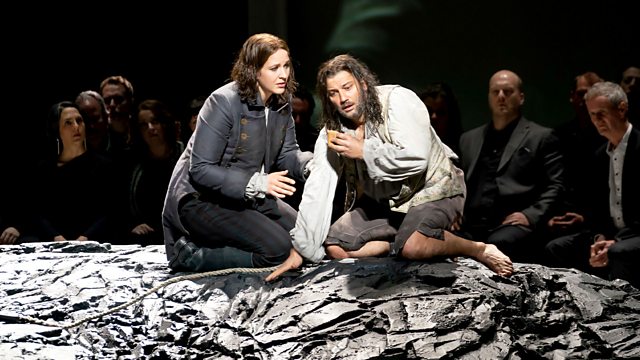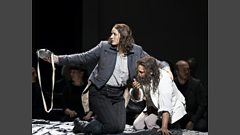
Beethoven's Fidelio from the Royal Opera House, Covent Garden
Antonio Pappano conducts a dream team of Jonas Kaufmann and Lise Davidsen, the husband-and-wife embodiment of courage, freedom and love in Beethoven's thrilling opera, Fidelio.
The triumph of love, courage and freedom over oppression, tyranny and evil are the eternal themes of Beethoven's only opera, a project close to his heart but which cost him dear in over a decade of revisions and rewrites.
Recorded at the Royal Opera House Covent Garden earlier this month, and the hot ticket of the season, Antonio Pappano conducts a dream team of a cast led by two of the most celebrated singers on today's operatic stage. In a new production by Tobias Kratzer, soprano Lise Davidsen plays Leonore, the devoted wife of Florestan (tenor Jonas Kaufmann), whose love for her wrongly imprisoned husband means she will stop at nothing to ensure his freedom. It causes all sorts of problems, from disguising herself as a man, Fidelio, and having to reject the unwelcome advances of Marzelline, the love-struck jailer's daughter, to courageously risking her life in a touch-and-go mission to free Florestan.
Beethoven's thrilling darkness-to-light journey is presented by Tom Service in conversation with the Rev. Lucy Winkett, including contributions from conductor, cast and director.
Beethoven: Fidelio
Act 1
7.55pm
Interval
Tom Service and Lucy Winkett explore some the themes of Beethoven's Fidelio and the way they've been interpreted in this production, with comments from Lise Davidsen, Antonio Pappano and Tobias Kratzer.
8.15pm
Act 2
Leonore.....Lise Davidsen (soprano)
Florestan.....Jonas Kaufmann (tenor)
Rocco.....Georg Zeppenfeld (bass)
Don Pizarro.....Michael Kupfer-Radecky (baritone)
Marzelline.....Amanda Forsythe (soprano)
Jaquino.....Robin Tritschler (tenor)
Don Fernando.....Egils Silinš (bass-baritone)
First Prisoner.....Filipe Manu (tenor)
Second Prisoner.....Timothy Dawkins (bass)
Chorus and Orchestra of the Royal Opera House
Antonio Pappano (conductor)
Last on
More episodes
Previous
Music Played
-
![]()
Ludwig van Beethoven
Fidelio (Leonore) - Opera Op.72 - Act 2 no.15; O namenlose Freude! [duet]
Singer: Lise Davidsen. Singer: Jonas Kaufmann. Singer: Amanda Forsythe. Singer: Robin Tritschler. Singer: Georg Zeppenfeld. Singer: Michael Kupfer-Radecky. Singer: Filipe Manu. Singer: Timothy Dawkins. Singer: Egils Siliņš. Choir: Chorus of the Royal Opera House, Covent Garden. Orchestra: Orchestra of the Royal Opera House, Covent Garden. Conductor: Sir Antonio Pappano. -
![]()
Ludwig van Beethoven
Fidelio (Leonore) - Opera Op.72 - Act 2 no.15; O namenlose Freude! [duet]
Singer: Lise Davidsen. Singer: Jonas Kaufmann. Singer: Amanda Forsythe. Singer: Robin Tritschler. Singer: Georg Zeppenfeld. Singer: Michael Kupfer-Radecky. Singer: Filipe Manu. Singer: Timothy Dawkins. Singer: Egils Siliņš. Choir: Chorus of the Royal Opera House, Covent Garden. Orchestra: Orchestra of the Royal Opera House, Covent Garden. Conductor: Sir Antonio Pappano. -
![]()
Ludwig van Beethoven
String Quartet No. 15 in A Minor, Op. 132
Ensemble: Tetzlaff Quartett.- Beethoven: String Quartets, Opp. 132, 130 & 133.
- Ondine.
- 1-5.
-
![]()
Franz Schubert
Impromptu in C minor, D 899 No 1
Performer: Murray Perahia.- Schubert: Impromptus, Op. 90 & 142; Murray Perahia.
- CBS.
- 1.
Synopsis
Like no other opera, Beethoven’s Fidelio falls into two unequal halves. Act I is a historical melodrama on freedom and love in the post-Revolutionary era. Act II is a political essay on the responsibility of the individual in the face of a silent majority, a musical plea for active empathy
��
Act I
Liberté, Égalité, Fraternité
A prison courtyard Marzelline, the daughter of prison director Rocco, attempts to ward off the advances of the young gatekeeper Jaquino (Jetzt, Schätzchen, jetzt sind wir allein). The two young people used to be a couple, but now she only has eyes for the new prison guard Fidelio, with whom she secretly dreams of a joint future (O wär’ ich schon mit dir vereint). What Marzelline little suspects is that Fidelio is in fact a noblewoman named Leonore, disguised as a man in order to search the prison for her vanished husband, Florestan. Leonore, Marzelline, Jaquino and Rocco indulge in wholly contrary hopes for the future (Mir ist so wunderbar).
��
Nor does Rocco suspect Fidelio’s true identity. He would like his new employee to be his future son-in-law and gives him a lesson in pragmatism (Hat man nicht auch Gold beineben). Marzelline tries to get closer to Fidelio, who, however, only hopes for a favour from Rocco: a visit down to the prison’s dungeon, where Florestan is presumably being held (Gut, Söhnchen, gut, hab immer Mut).
The arrival of the governor Don Pizarro is announced (March). Pizarro, formerly Florestan’s close friend, has been transformed by political circumstances into his bitterest foe and is responsible for Florestan’s secret imprisonment. Awaiting a prison inspection by the minister, he resolves to kill Florestan before his whereabouts can be discovered (Ha! Welch ein Augenblick). Pizarro instructs Rocco to prepare for the illegal execution and in return promises a rich reward. Rocco is torn between pity and obedience (Jetzt, Alter, jetzt hat es Eile!).
��
Leonore, too, sees herself forced into action by Pizarro’s plans. Terrified, she recalls her love for Florestan and her inner determination (Abscheulicher! Wo eilst du hin?). As her first act of human sympathy she persuades Rocco to allow the prisoners to spend a brief moment of happiness in the fresh air (O welche Lust, in freier Luft). Pizarro is outraged, but grants Rocco’s request to take Fidelio as his assistant into the dungeon where Florestan lies in chains. Together, Leonore and Rocco begin their descent into the secret chamber.
��
Act II
‘Whoever thou art, I shall save thee...’
A dungeon
Florestan feels nothing but darkness and silence. He is denied any form of help. Only the thought of Leonore allows him to maintain his faith in God and Man (Gott! Welch Dunkel hier!). ��Rocco and Fidelio excavate a grave. Leonore finds it hard to recognize her husband in the distraught prisoner, but she is determined to rescue him, even if he is not Florestan (Nur hurtig fort, nur frisch gegraben). She again succeeds in persuading Rocco to an act of human kindness. More than bread and water, Florestan is moved by the stranger’s comfort. He, too, does not yet recognize his wife (Euch werde Lohn in bessern Welten).
��
With the entrance of Pizarro, events come thick and fast. Pizarro wants to carry out the execution in person (Er sterbe!). But just before he can murder Florestan, Fidelio steps between the two men and discloses her true identity: ‘First kill his wife!’ Amid the confusion a trumpet signal resounds, seemingly announcing the redemptive arrival of the minister, although danger still remains. Leonore and Florestan finally recognize each other (O namenlose Freude!).
��
Not until the people raise their voice does the dungeon give way to an open square. A minister pardons Florestan in the name of the throng. Don Pizarro is overpowered. And Marzelline subordinates her personal feelings to the general liberation. The euphoria at Leonore’s act of rescue knows no bounds (Heil sei dem Tag).
��
Tobias Kratzer
Translation by texthouse
Broadcast
- Sat 28 Mar 2020 18:30����ý Radio 3
Featured in...
![]()
More music on Radio 3—Radio 3 in Concert
We broadcast more live and specially-recorded concerts and opera than any other station.



